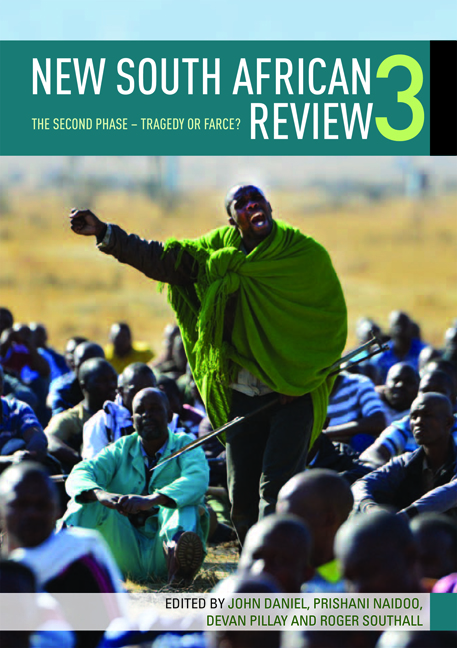Book contents
- Frontmatter
- Contents
- Preface
- Introduction: The second phase – tragedy or farce?
- PART 1 Party, Power and Class
- Introduction: Party, power and class
- Chapter 1 The power elite in democratic South Africa: Race and class in a fractured society
- Chapter 2 The ANC circa 2012-13: Colossus in decline?
- Chapter 3 Fragile multi-class alliances compared: Some unlikely parallels between the National Party and the African National Congress
- Chapter 4 Predicaments of post-apartheid social movement politics: The Anti-Privatisation Forum in Johannesburg
- PART 2 Ecology, Economy and Labour
- PART THREE Public Policy and Social Practice
- PART 4 South Africa at Large
- Contributors
- Index
Chapter 1 - The power elite in democratic South Africa: Race and class in a fractured society
from PART 1 - Party, Power and Class
Published online by Cambridge University Press: 31 May 2019
- Frontmatter
- Contents
- Preface
- Introduction: The second phase – tragedy or farce?
- PART 1 Party, Power and Class
- Introduction: Party, power and class
- Chapter 1 The power elite in democratic South Africa: Race and class in a fractured society
- Chapter 2 The ANC circa 2012-13: Colossus in decline?
- Chapter 3 Fragile multi-class alliances compared: Some unlikely parallels between the National Party and the African National Congress
- Chapter 4 Predicaments of post-apartheid social movement politics: The Anti-Privatisation Forum in Johannesburg
- PART 2 Ecology, Economy and Labour
- PART THREE Public Policy and Social Practice
- PART 4 South Africa at Large
- Contributors
- Index
Summary
The major debate that took place from the 1970s between liberal historians and their Marxist-revisionist opponents revolved around whether there was a functional relationship between the policies pursued by successive South African governments and the interests of capital. On the one hand, the liberal historians argued that there was considerable contestation between political and economic power holders; on the other, the Marxian-revisionists proposed that the relationships between them were broadly compatible, with changing political policies reflecting the changing interests of dominant elements of capital across different eras. Inevitably, the debate was inconclusive but there was nonetheless to be a considerable convergence around the idea that, from the mid-1970s, the mounting costs of the National Party's rigid adherence to key tenets of apartheid were increasingly costly to large-scale capital, which, during the 1980s, came to exert significant pressure upon the government to enter into negotiations with the African National Congress (ANC).
From this broad agreement have flowed two assertions. The first is that the sustainability of South African capitalism requires the overall compatibility of what Sampie Terreblanche refers to as the systems of political legitimation and economic accumulation. From this perspective, the economic strains brought about by political crisis required the transition from white minority rule to a ‘liberal capitalist version of democratic capitalism’ (Terreblanche 2002: 456). The second assertion is that the transition to democracy was brought about by an ‘elite compromise’ structured around the concession of political democracy to the incoming ANC in return for its acceptance of the existing contours of capitalism. Although allowing for the expropriation of property by the state subject to market-value compensation and due process, the post-apartheid constitutions entrenched the rights of private property. This signalled that any government seeking to address the highly unequal, racially structured ownership patterns of the pre-democratic era whereby whites dominated the economy, would do so incrementally. The ANC was soon to find it appropriate to quietly discard (or at least to postpone to an unspecified distant future) commitments to socialism, and to abandon nationalisation in favour of market-driven policies. The move from the social democraticallyinclined Redistribution and Development Programme (RDP) to the pro-market Growth, Employment and Redistribution (Gear) strategy in 1996 is but the most widely acknowledged marker of the conversion of ANC policy makers to capitalist economics.
- Type
- Chapter
- Information
- New South African Review 3The second phase - Tragedy or Farce?, pp. 17 - 38Publisher: Wits University PressPrint publication year: 2013



